Tricuspid atresia - Study guides, Class notes & Summaries
Looking for the best study guides, study notes and summaries about Tricuspid atresia? On this page you'll find 313 study documents about Tricuspid atresia.
Page 2 out of 313 results
Sort by
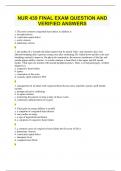
-
NR-439:| NR 439 EVIDENCE BASED PRACTICE GRADED A+ EXAM 1
- Exam (elaborations) • 46 pages • 2024
-
Available in package deal
-
- $10.00
- + learn more
NR-439:| NR 439 EVIDENCE BASED PRACTICE GRADED A+ EXAM 1 NUR 439 FINAL EXAM QUESTION AND VERIFIED ANSWERS 1. The most common congenital heart defect in children is a. tricuspid atresia b. ventricular septal defect c. aortic stenosis d. pulmonary atresia b 2. the mother of a 4 month old infant reports that he turned "blue" and seemed to have fast labored breathing after vigorous crying soon after awakening. He settled down and his color and breathing seemed to improve. On physical examinatio...
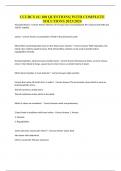
-
CCI RCS #1| 100 QUESTIONS| WITH COMPLETE SOLUTIONS 2023/2024
- Exam (elaborations) • 27 pages • 2023
-
- $8.49
- + learn more
CCI RCS #1| 100 QUESTIONS| WITH COMPLETE SOLUTIONS 2023/2024 Tricuspid Atresia - Correct Answer Absence of tricuspid valve and hypoplastic RV; requires both ASD and VSD for viability. ascites - Correct Answer accumulation of fluid in the peritoneal cavity What effect would inspiration have on the mitral valve velocity? - Correct Answer With inspiration, the mitral valve velocity would increase. Peak mitral inflow velocity can be used to predict mitral regurgitation severity. During Ins...
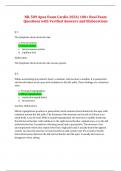
-
NR-509 Apea Exam Cardio 2024| 100+ Real Exam Questions with Verified Answers and Elaborations
- Exam (elaborations) • 54 pages • 2024
-
- $15.49
- + learn more
NR-509 Apea Exam Cardio 2024| 100+ Real Exam Questions with Verified Answers and Elaborations Sample Questions: Q 1: The lymphatic ducts drain into the: a. Arterial system. b. Venous system. c. Arteriovenous system. d. Capillary bed. Elaboration: The lymphatic ducts drain into the venous system. Q 2: While auscultating the patient's heart, a medium, soft murmur is audible. It is pansystolic and heard loudest at the apex with radiation to the left axilla. These findings are consis...
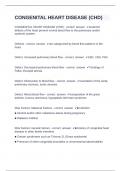
-
CONGENITAL HEART DISEASE Question and answers 100% correct 2024
- Exam (elaborations) • 17 pages • 2024
-
Available in package deal
-
- $13.49
- + learn more
CONGENITAL HEART DISEASE Question and answers 100% correct 2024 CONGENITAL HEART DISEASE (CHD) - correct answer Anatomic defects of the heart prevent normal blood flow to the pulmonary and/or systemic system. Defects - correct answer are categorized by blood flow patterns in the heart Defect: Increased pulmonary blood flow - correct answer ASD, VSD, PDA Defect: Decreased pulmonary blood flow - correct answer Tetralogy of Fallot, tricuspid atresia Defect: Obstruction to blo...
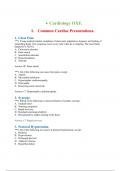
-
Internal Medicine Exam Guide Questions and Answers (Revised & Verified) 2024.
- Exam (elaborations) • 185 pages • 2024
- Available in package deal
-
- $15.99
- + learn more
Internal Medicine Exam Guide Questions and Answers (Revised & Verified) 2024. Cardiology OXF. I. Common Cardiac Presentations. 1. Chest Pain. ***) Young medical student complains of chest pain, palpitation, dyspnea, and feeling of impending death. The symptoms occur every time when he is studying. The most likely diagnosis is: Q2012 A. Conversion disorder B. Panic attack C. Somatoform disorder D. Hypochondriasis E. Syncope Answer: B* Panic attack ***) All of the following can ca...
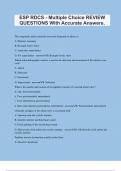
-
ESP RDCS - Multiple Choice REVIEW QUESTIONS With Accurate Answers.
- Exam (elaborations) • 25 pages • 2024
-
- $12.49
- + learn more
ESP RDCS - Multiple Choice REVIEW QUESTIONS With Accurate Answers. The congenital cardiac anomaly seen most frequently in adults is: A. Ebstein's Anomaly B. Bicuspid Aortic Valve C. ventricular septal defect D. AV septal defect - answerB. Bicuspid Aortic valve Which echocardiographic window is used in the detection and assessment of the inferior vena cava? A. Apical B. Subcostal C. Parasternal D. Suprasternal - answerB. Subcostal What is the number and location of the papillary mus...
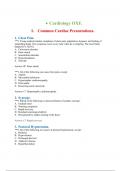
-
Internal Medicine Exam Guide Questions and Answers (Revised & Verified) 2024.
- Exam (elaborations) • 185 pages • 2024
- Available in package deal
-
- $14.99
- + learn more
Internal Medicine Exam Guide Questions and Answers (Revised & Verified) 2024. Cardiology OXF. I. Common Cardiac Presentations. 1. Chest Pain. ***) Young medical student complains of chest pain, palpitation, dyspnea, and feeling of impending death. The symptoms occur every time when he is studying. The most likely diagnosis is: Q2012 A. Conversion disorder B. Panic attack C. Somatoform disorder D. Hypochondriasis E. Syncope Answer: B* Panic attack ***) All of the following can ca...
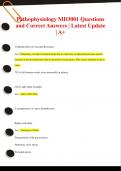
-
Pathophysiology MD3001 Questions and Correct Answers | Latest Update | A+
- Exam (elaborations) • 18 pages • 2024
- Available in package deal
-
- $13.39
- + learn more
1st Breath effect on Vascular Resistance Ans: Pulmonary vascular resistance drops due to a decrease in right atrial pressure and an increase in left atrial pressure (due to increased venous return. This causes Foramen ovale to close. 75% of all foramen ovales close structurally in infancy. Left to right shunt examples Ans: ASD, VSD, PDA Is asymptomatic or causes breathlessness Right to left shunt Ans: Tetralogy of Fallot Transposition of the great arteries. Pulmonary valve atresia...
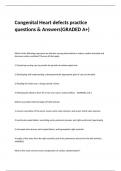
-
Congenital Heart defects practice questions & Answers(GRADED A+) Which of the following represents an effective nursing intervention to reduce cardiac demands and decrease cardiac workload? Choose all that apply. 1) Clustering nursing care to provide
- Exam (elaborations) • 24 pages • 2024
-
- $13.49
- + learn more
Which of the following represents an effective nursing intervention to reduce cardiac demands and decrease cardiac workload? Choose all that apply. 1) Clustering nursing care to provide for periods of uninterrupted rest. 2) Developing and implementing a developmentally appropriate plan of care as tolerated. 3) Feeding the infant over a longer period of time. 4) Allowing the infant to have his or her own way to avoid conflicts. - ANSWER1 and 2 Defects associated with tetralogy of F...
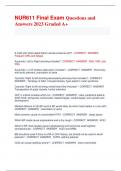
-
NUR611 Final Exam Questions and Answers 2023 Graded A+
- Exam (elaborations) • 12 pages • 2024
-
- $15.49
- + learn more
NUR611 Final Exam Questions and Answers 2023 Graded A+ A child with atrial septal defect usually presents with? - CORRECT ANSWER Frequent URIs and fatigue Acyanotic: Left to Right shunting includes? - CORRECT ANSWER ASD, VSD, and PDA Acyanotic: L to R Outflow obstruction includes? - CORRECT ANSWER Pulmonary and aortic stenosis, coarctation of aorta Cyanotic: Right to left shunting decreased pulmonary flow includes? - CORRECT ANSWER Tetralogy of fallot, tricuspid atresia, hypo plast...

$6.50 for your textbook summary multiplied by 100 fellow students... Do the math: that's a lot of money! Don't be a thief of your own wallet and start uploading yours now. Discover all about earning on Stuvia


